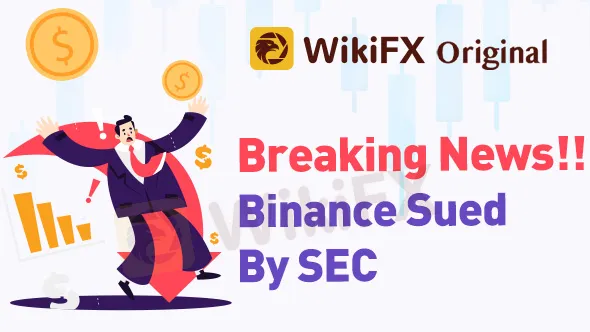简体中文
繁體中文
English
Pусский
日本語
ภาษาไทย
Tiếng Việt
Bahasa Indonesia
Español
हिन्दी
Filippiiniläinen
Français
Deutsch
Português
Türkçe
한국어
العربية
Breaking News!!! Binance Sued By SEC
Abstract:The United States Securities and Exchange Commission (SEC) has filed multiple charges against cryptocurrency exchange Binance, its affiliated entities, and CEO Changpeng Zhao, alleging illegal operations and the violation of securities laws.

The US Securities and Exchange Commission (SEC) has brought forth a series of charges against cryptocurrency exchange Binance, its affiliated entities, and Founder/CEO Changpeng Zhao, alleging the operation of illegal trading platforms, the offering of unregistered crypto asset securities, and the commingling of customers' funds.
According to the SEC, Binance operated as an exchange, broker-dealer, and clearing agency without proper authorization, a claim similar to that made by the US derivatives watchdog, the Commodity Futures Trading Commission (CFTC), two months prior.
In its complaint filed with a district court in Columbia, the SEC accused Binance Holdings of running unregistered crypto exchanges, namely Binance.com and its US arm, Binance.US. The regulator also alleged that Binance manipulated its controls to allow high-value US customers to trade on Binance.com, despite publicly stating that US clients were restricted from the platform.
Furthermore, the SEC claimed that affiliated entities BAM Trading and BAM Management, together with Binance, offered and sold unregistered tokens (BNB) and stablecoins (BUSD) on the Binance.US platform. These entities also allegedly provided unregistered profit-generating programs and crypto staking products to US investors.
The SEC further accused Zhao and Binance of secretly controlling the US arm, despite asserting publicly that it operated as an independent trading platform for US investors.
In February, the SEC alleged that Zhao and Binance had access to Binance.com and Binance.US, enabling them to commingle customer assets or redirect them to Sigma Chain, a market maker owned and controlled by Zhao. These assets were later transferred to Merit Peak Limited, also owned by Zhao, and subsequently sent to a third party for the purchase and sale of crypto assets.
The SEC claimed that BAM Trading and BAM Management misled investors about surveillance controls to prevent manipulative trading on Binance.US, allowing them to raise approximately $200 million from private investors and attract billions of dollars in trading volumes.
Additionally, the SEC accused Binance and Zhao of implementing a multi-step plan to evade US laws, potentially jeopardizing billions of dollars of US investor capital.
In response to the lawsuit, Binance stated in a blog post that the SEC had abandoned efforts to negotiate a settlement and criticized the regulator for rushing to claim jurisdictional ground. Binance assured users that their assets on the US trading platform were secure and pledged to vigorously defend against the allegations.

Binance emphasized its readiness to confront the SEC's actions within the confines of the law, rejecting the notion that users' assets were at risk and expressing dissatisfaction with the SEC's handling of the investigation.

Disclaimer:
The views in this article only represent the author's personal views, and do not constitute investment advice on this platform. This platform does not guarantee the accuracy, completeness and timeliness of the information in the article, and will not be liable for any loss caused by the use of or reliance on the information in the article.
Read more

Bybit Shuts Down NFT Marketplace Amid Crypto Market Downturn
Bybit announces the closure of its NFT marketplace, citing efforts to streamline offerings. Discover the latest trends in the declining NFT market and its shift to utility-based growth.

Galaxy Digital Settles $200M in Luna Token Manipulation Case
Galaxy Digital pays $200M to settle Luna token manipulation probe by NY regulators, linked to TerraUSD’s 2022 crash, impacting crypto market stability.

Vanuatu Passes VASP Act to Regulate Crypto and Digital Assets
Vanuatu's new VASP Act regulates crypto businesses, enforcing strict licensing, AML/CFT compliance, and investor protections.

Blockchain Decentralization: Empowering a Trustless Future
In recent years, blockchain technology has rapidly evolved from a niche innovation behind Bitcoin into a transformative force across industries. At its core, blockchain decentralization refers to the distribution of authority and decision-making away from a central entity and into the hands of a distributed network of participants. This shift redefines how data is stored and verified and paves the way for trustless, transparent, and resilient systems that challenge traditional centralized models.
WikiFX Broker
Latest News
The Withdrawal Trap: How Scam Brokers Lure Victims into Paying More
FCA to Investors: Think Twice Before Trusting These Brokers
Trump\s tariffs: How could they affect the UK and your money
Trump gambles it all on global tariffs he\s wanted for decades
TradingView Brings Live Market Charts to Telegram Users with New Mini App
Trump tariffs: How will India navigate a world on the brink of a trade war?
Interactive Brokers Launches Forecast Contracts in Canada for Market Predictions
Authorities Alert: MAS Impersonation Scam Hits Singapore
Stocks fall again as Trump tariff jitters continue
IG Group Acquires Freetrade for £160M to Expand UK Investment Market
Currency Calculator







